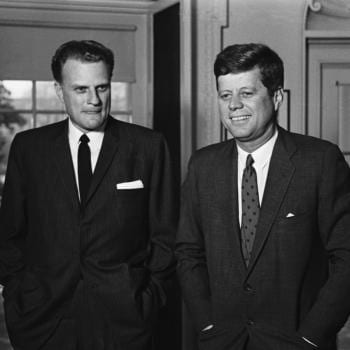I can well understand why some mainline Protestants would consider converting to Roman Catholicism. The mainline churches in the U.S. have been afflicted with theological modernism for at least a century and have capitulated on any number of moral teachings since the sexual revolution of the 1960s.
And yet, news comes of the latest efforts to achieve a full reconciliation between the Lutheran and Roman Catholic communions:
A new milestone in Catholic-Lutheran dialogue was marked in October, when top theologians, representing respectively the U.S. Conference of Catholic Bishops and the Evangelical Lutheran Church in America (ELCA), created a new baseline for further ecumenical discussion called “Declaration on the Way,” which revealed how much closer the two churches had come together.
“It is a step moving towards unity,” said Auxiliary Bishop Denis Madden of Baltimore, co-chair of the Catholic-Lutheran task force of scholarly theologians that worked for two years to produce the document. “It very much fits with Pope Francis’ call for dialogue and drawing closer together.”
Bishop Madden said the declaration was a response to the expressed desire of Cardinal Kurt Koch, president of the Pontifical Council for Promoting Christian Unity, that the achievements of the Catholic-Lutheran dialogue be compiled and summarized in a single document.
The declaration’s 32 “Statements of Agreement” on the nature of the church, ministry and the Eucharist — complete with supporting documentation and scholarship — are drawn from the past 50 years of Catholic-Lutheran national and international agreements. The declaration also contains 15 points of disagreement of varying degrees that it recommended should be explored in further dialogues. It also contains suggestions for how both Catholic and Lutheran parishes could grow closer together, while the theological dialogue is ongoing.
For the Lutheran-challenged, the Evangelical Lutheran Church in America is the liberal wing of American Lutheranism. Here is how one pastor from a conservative Lutheran denomination (Missouri Synod) distinguishes his communion from ELCA:
On the surface one might notice certain similarities between the ELCA and LCMS before one notices differences. Both churches do have the name “Lutheran” on their front signs after all. The services used in both church bodies are very similar. The hymnody sung in both churches is very similar. The robes of the pastor, the colors on the altar, the layout of the churches all might be much the same in ELCA and LCMS congregations.
With a little closer look one might see a few apparent differences. For instance, one might notice that ELCA congregations have women pastors where LCMS churches do not. One might also see members of Methodist, Presbyterian, the United Church of Christ, or Episcopal churches going to communion at ELCA altars, where one wouldn’t see that in the LCMS. For that matter it would even be possible to see pastors from these other denominations officiating at ELCA services where one would never see a non-Lutheran pastor serving an LCMS congregation.
A little deeper look uncovers yet more differences. If one examined the teachings of the ELCA in regard to homosexuality and compared those to the Missouri Synod one would see that the ELCA allows for practicing homosexuality even among its clergy and does not condemn homosexuality as sin. The Missouri Synod says that homosexuality is a sin. If an LCMS clergyman is found to be a practicing homosexual he is removed from office.
Other points of difference one might notice include: the LCMS has very strong statements condemning abortion as a sin against the 5th commandment; the ELCA does not take a stand against abortion as sin and allows for it as a viable option in various situations. The LCMS believes that the Lord’s Supper is the actual body and blood of Christ and says that those who deny the real presence of Christ are holding views contrary to Scripture. The ELCA, while saying the Lord’s Supper is the body and blood of Christ, also grants as valid other views which deny the Real Presence of Christ in the Sacrament.
The question is why the Roman Catholic church which opposes many of the same things that the Missouri Synod opposes look to ELCA as an ecumenical partner when these Evangelical Lutherans disagree with Rome on so many matters?
Makes you think something happened at Vatican II.












